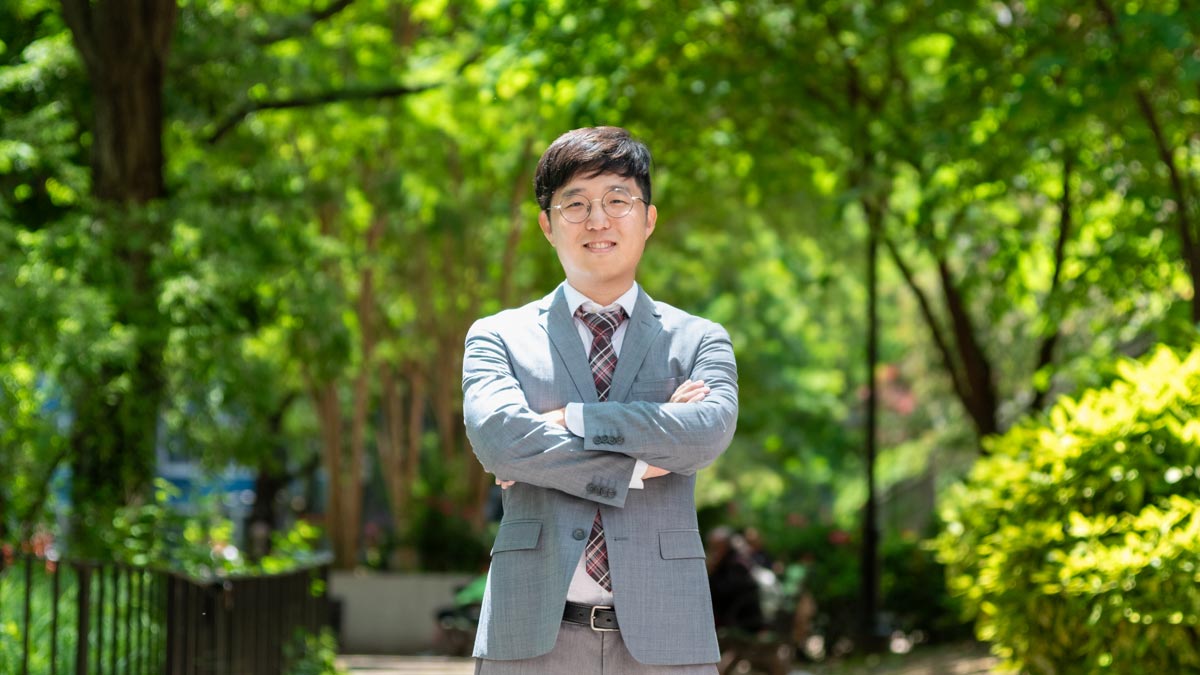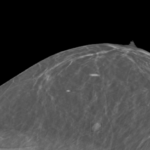Jungkyu “JP” Park has successfully defended his PhD thesis in biomedical imaging and technology at NYU Grossman School of Medicine. The defense was held on Monday, June 2, at NYU Langone Health.
In the course of his PhD research, Dr. Park has led the development of artificial intelligence systems to address outstanding clinical needs in screening for breast cancer, the deadliest of all cancers affecting women in the U.S. and abroad. His thesis is titled “Advancing Breast Cancer Screening with AI: Development and Deployment of Multimodal Deep Learning Models.” It was advised by Krzysztof Geras, PhD, adjunct assistant professor in the department of radiology at NYU Langone, and Linda Moy, MD, professor in the department of radiology at NYU Langone. (Dr. Moy is a clinician-scientist with the Center for Advanced Imaging Innovation and Research; Dr. Geras, until recently with the research center, is chief scientific officer and co-founder at Ataraxis, a startup developing artificial intelligence solutions for medicine).
Breast cancer screening reduces mortality by about half but still misses 13 percent of malignancies, and approximately one percent of mammography exams lead to unnecessary biopsies (in the U.S., where annual mammographies total an estimated 40 million, this represents hundreds of thousands of biopsies). Artificial intelligence has the potential to help improve these numbers by increasing detection rates and decreasing unnecessary biopsy referrals. However, the technology faces multiple challenges, including “computational constraints with high-resolution imaging, limited generalization … insufficient prospective validation, and underutilization of multimodal and longitudinal imaging data,” writes Dr. Park in his thesis, enumerating the issues his research has sought to mitigate.
To begin, Dr. Park and colleagues focused on developing AI for detecting cancer on digital breast tomosynthesis (DBT), a type of three-dimensional imaging that delivers richer views of breast tissue than do traditional two-dimensional mammograms but requires more time to read. A DBT volume can comprise more than a hundred high-resolution images; searching them for tiny lesions—akin to looking for the proverbial needle in a haystack—is computationally prohibitive for conventional AI methods. The solution led by Dr. Park, called 3D-Globally Aware Multiple Instance Classifier (3D-GMIC), combines a high-level network that evaluates the whole of each slice for potential areas of concern with a detail-level network that devotes computational resources only to those areas. In a paper published in the journal IEEE Transactions on Medical Imaging, Dr. Park and coauthors show that the model dramatically reduces associated computational costs and generalizes well to DBT data from another institution.
While developing 3D-GMIC, Dr. Park has worked with colleagues at NYU Langone to build a collection of data from more than one million breast exams conducted with multiple imaging modalities—including 2D mammography and DBT—with expert lesion annotations and cancer labels confirmed by biopsy results. This collection has become integral to the development of a new multimodal AI system for screening mammography, which Dr. Park and colleagues trained on more than 750,000 exams, validated on external datasets, and deployed in a prospective study at 18 clinical sites, where it reduced recall rates for patients with low cancer risk. In 2021 an early version on this system won an open competition called DBTex that called for novel AI detection algorithms for DBT. In a preprint detailing the system and the team’s findings, Dr. Park and coauthors note that the results “underscore the importance of utilizing all available imaging modalities, demonstrate the potential for clinical impact, and indicate feasibility of further reduction of the test error with increased training set when using large-capacity neural networks.”
In a third major investigation, Dr. Park has co-led a retrospective study exploring how well AI could estimate a patient’s risk of developing breast cancer within up to five years from the date of screening. (The other lead is Yiqiu Shen, PhD, assistant professor in the department of radiology at NYU Grossman School of Medicine and expert in explainable deep learning AI systems for the analysis of medical images; the authors presented a preliminary AI model at Machine Learning for Health 2023.) Integrating mammography and DBT data with ultrasound—which is often used for follow-up examinations of recalled patients—together with data from medical records, Dr. Park and colleagues have developed a neural network that “can capture temporal changes in breast tissue and leverage complementary information, significantly enhancing long-term risk prediction compared to a traditional clinical model,” he writes in his dissertation. In sum, he writes, his research “lays the groundwork for transforming breast cancer screening practices, enhancing early detection, optimizing clinical workflows, and ultimately improving patient outcomes.”
Related Preprints and Publications
A Multi-Modal AI System for Screening Mammography: Integrating 2D and 3D Imaging to Improve Breast Cancer Detection in a Prospective Clinical Study.
Preprint posted online April 8, 2025; revised April 11, 2025. arXiv:2504.05636 [eess.IV]
An Efficient Deep Neural Network to Classify Large 3D Images With Small Objects.
IEEE Trans Med Imaging. 2024 Jan;43(1):351-365. doi: 10.1109/TMI.2023.3302799
Leveraging Transformers to Improve Breast Cancer Classification and Risk Assessment with Multi-modal and Longitudinal Data.
Preprint posted online November 6, 2023; revised November 15, 2023. arXiv:2311.03217 [eess.IV]
Lessons from the first DBTex Challenge.
Nat Mach Intell. 2021;3:735-736. doi: 10.1038/s42256-021-00378-z
Related Stories
Yiqiu "Artie" Shen, machine learning researcher who develops artificial intelligence systems for medical imaging, talks about AI's ability to explain itself, guide discovery, and predict cancer risk.
Krzysztof Geras and Jan Witowski, machine learning researchers in medical imaging, talk about understanding one's data, working across disciplines, and radiologists' "new colleague."
NYU Langone researchers won a deep learning challenge to detect lesions in digital breast tomosynthesis (DBT) images. We discuss the obstacles that DBT poses to deep learning and look at how our team navigated them.




